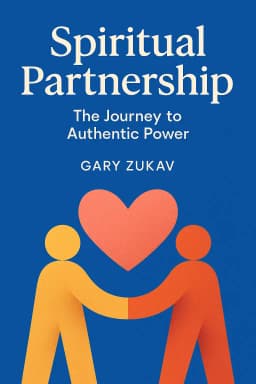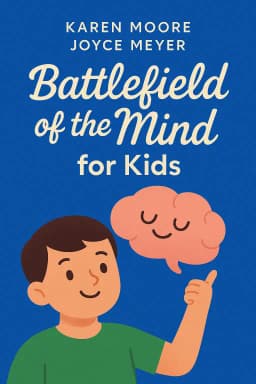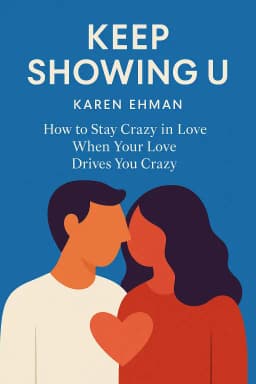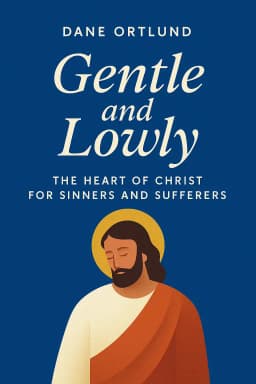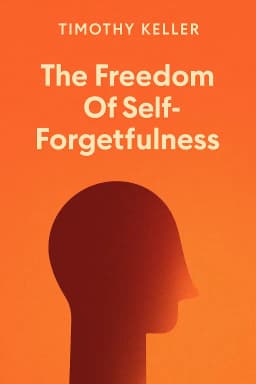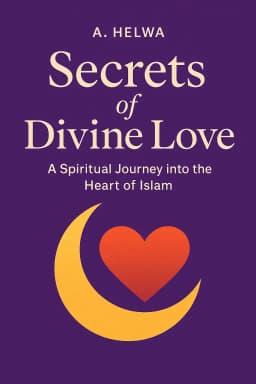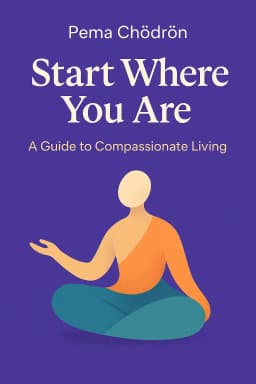
Healing Isn't Hostage
Discover How to Move On, Make Peace with Painful Memories, and Create a Life That’s Beautiful Again
Golden Hook & Introduction
SECTION
Daniel: Okay, Sophia. Forgiving What You Can't Forget. Give me your five-word review. Sophia: Hmm. ‘Pain is messy, God's grace… messier?’ Daniel: Ha! I love it. Mine is: ‘Stop waiting, start forgiving yourself.’ Sophia: Ooh, that's good. And that's exactly the tension we're getting into today. It’s a topic that sounds so simple on the surface, but is one of the hardest things a human can do. Daniel: It really is. And today we are diving deep into Forgiving What You Can't Forget: How to Move On, Make Peace with Painful Memories, and Create a Life That's Beautiful Again by Lysa TerKeurst. Sophia: And what’s fascinating about TerKeurst is that she isn't just some academic writing from a distance. She’s the president of Proverbs 31 Ministries, a huge Christian women's organization, and this book comes directly from her own very public and painful marital struggles. Daniel: Exactly. She writes with a raw authenticity that’s incredibly rare. It’s no surprise it became a #1 New York Times bestseller. She’s not just telling you how to forgive; she’s showing you the scars from her own journey of having to do it. It feels earned. Sophia: That definitely changes things. It’s not a lecture; it’s a field report from the front lines of heartbreak. So where does she even start? Because I think we can all agree that when you're deeply hurt, the advice to 'just forgive and forget' is possibly the worst, most invalidating advice on the planet. Daniel: She starts right there, in that exact place of messy, raw, and completely chaotic pain. She argues that before you can even think about forgiveness, you have to be honest about the state you're in.
The Unrestrained Chaos of Unforgiveness
SECTION
Daniel: TerKeurst has this incredible story that perfectly captures the chaos. She calls it the "Delivery Gal Incident." One afternoon, she's at home, feeling completely triggered by her unresolved marital pain. She’s seething, feeling like all her progress is a sham. Sophia: I know that feeling. It’s like a tidal wave of anger that just wipes everything else out. Daniel: Precisely. And she describes this venomous rage building up until she has to physically release it. So she jerks open her front door and just starts slamming it, over and over, screaming and flailing her arms. A complete, primal meltdown. Sophia: Oh, wow. That is… vivid. And very human. Daniel: But here's the kicker. In the middle of this tirade, she looks up and sees a delivery woman standing on her front steps, package in hand, just staring at her with wide eyes. Sophia: No! Oh, the secondhand embarrassment is real. What did the delivery gal do? Daniel: She just slowly puts the package down, backs away, and drives off. And TerKeurst is left there, mortified. She says she spent the rest of the day in a foul mood, snapping at her family, consumed by this feeling that they—the people who hurt her—made her act this way. Sophia: That’s the core of it, isn't it? The blame. "You made me this way." It feels so true in the moment. Daniel: It does. And she uses this to illustrate a core point: "Unresolved pain triggers unrestrained chaos." Your reaction might not be slamming a door in front of a delivery person. It might be numbing with food or shopping, or becoming cynical and negative, or subtly manipulating situations. But the chaos is there. Sophia: She also talks about how we define our lives by a 'before' and 'after' a deep hurt. It’s like that painful event becomes the new North Star for your entire life story. Everything is measured against it. Daniel: Yes, a life divided. And she says that as long as you're stuck there, defining your life by what they did, you're handing them the power. You're waiting for them to fix a pain they may not even acknowledge. Sophia: That’s a prison. If your healing depends on someone else's actions, you might be waiting forever. So how do you break out of that? How do you take the power back when you feel completely powerless? Daniel: That’s the million-dollar question, and her answer is both profoundly spiritual and surprisingly practical. It starts with a radical shift in perspective.
The Mechanics of Healing: A Process, Not a Feeling
SECTION
Daniel: The book's most powerful, counterintuitive idea is this: your ability to heal cannot depend on anyone's choices but your own. Your healing is not held hostage by their apology, their remorse, or their understanding. Sophia: Okay, I love that in theory. But how does that work in practice? When every fiber of your being is screaming for justice or at least an acknowledgment of the pain they caused? Daniel: She uses a brilliant biblical analogy. She’s on a trip to Jerusalem, and her guide points out that Jesus performed two of his most famous healing miracles there. The first was a lame man at the pool of Bethesda. Jesus asks him, "Do you want to be healed?" The man's response is an excuse: "I have no one to help me into the pool." He’s waiting for someone else to act. Sophia: He’s outsourcing his healing. Daniel: Exactly. But Jesus ignores the excuse and gives him a command: "Get up, pick up your bed, and walk." The healing was tied to the man's own choice to obey, not to the actions of others. It was the same with the blind man at the pool of Siloam. Jesus puts mud on his eyes and tells him to go wash. His healing was contingent on his own action. Sophia: So the message is: stop waiting for someone to carry you to the healing pool. God is asking you to do something, right here, right now. Daniel: That's the theological foundation. And from there, she offers one of the most practical exercises I've ever read. It’s for when your feelings are absolutely not on board with forgiveness. She calls it the "3x5 card" exercise. Sophia: I’m intrigued. This sounds like arts and crafts for the soul. Daniel: It kind of is! Her counselor, Jim, had her take a stack of 3x5 index cards and write down every single factual thing her husband, Art, did that wounded her. Not her feelings about it, but the cold, hard facts. "He did this." "He said that." Sophia: That sounds incredibly painful. Just listing it all out. Daniel: Excruciating. But it’s about giving dignity to the pain by acknowledging the facts. Then, she had to take each card, one by one, place it on the floor, and say out loud, "I forgive Art for [the specific fact on the card]." And here’s the crucial part. She adds, "And whatever my feelings don't yet allow for, the blood of Jesus will surely cover." Sophia: Wow. That last line is powerful. It’s an admission that your willpower isn't enough. It's acknowledging the gap between your decision and your emotional reality. Daniel: And after she says it, she covers the card with a small red felt square, symbolizing that grace. She does this for every single card until the floor is covered. It's a physical ritual for a deeply emotional and spiritual process. It makes the abstract decision to forgive a concrete, marked moment in time. Sophia: It’s separating the decision from the feeling. You can decide to forgive right now, even if the feeling of forgiveness takes months or years to catch up. Daniel: That’s the core of it. She says, "Forgiveness is both a decision and a process." The 3x5 card exercise is the decision. It’s the moment you say, "I will not be bound by this anymore." The process is what happens next, when a trigger comes up—a song, a place, a name—and you have to forgive the impact all over again. Sophia: That makes so much sense. Because the hurt doesn't just happen once. It echoes. So, the process is about dealing with the echoes. Daniel: Yes. And that process is where the long-term strategy comes in. Because forgiving someone doesn't mean you have to go back to dancing with their dysfunction.
Boundaries and Bitterness: The Long-Term Strategy for a Beautiful Life
SECTION
Sophia: Okay, this is the part I think is so critical and so often misunderstood. People hear the word 'forgiveness,' especially in a religious context, and they immediately think it means you have to be a doormat. It means you have to let the person back into your life, no questions asked. Daniel: And TerKeurst argues that is a dangerous and unbiblical misconception. She makes it clear that forgiveness and reconciliation are two different things. Forgiveness is a command you do for your own freedom. Reconciliation is a process that requires two willing and safe parties. Sophia: So you can forgive someone and still decide they can't be in your life? Daniel: Absolutely. And that’s where boundaries come in. She has this quote that completely reframed it for me: "Boundaries aren't to push others away. They are to hold you together." Sophia: I love that. It’s not a wall to punish them; it’s a fence to protect your own sanity and well-being. It’s about self-preservation, not retaliation. Daniel: Exactly. It’s you saying, "I can love you and forgive you from over here, where your choices can no longer shatter my life." She shares this gut-wrenching story of driving home at 1:30 in the morning in the pouring rain, feeling completely devastated by a destructive choice someone she loved had just made. And she realizes she can't control their choices any more than she can stop the rain. All she can control is whether she's going to stand in the storm and get soaked or build a shelter. Boundaries are that shelter. Sophia: And the alternative to building that shelter is bitterness, which she describes as a poison. Daniel: A poison that makes big promises. Bitterness whispers to you that holding onto your anger gives you power, that it keeps the other person in a debt they can never repay. But she says bitterness is a bad deal. It promises to hurt them, but it only corrodes you. Sophia: It's like drinking poison and waiting for the other person to die. Daniel: A perfect analogy. She uses the parable of the Prodigal Son, but focuses on the older brother. The one who did everything right, but was so consumed with bitterness and resentment over the grace shown to his brother that he couldn't even enter the party. He was outside, in the cold, while the celebration of grace was happening inside. Bitterness locked him out of his own joy. Sophia: That’s a chilling way to put it. Now, a lot of this is framed within a Christian context—the blood of Jesus, God's grace. For a listener who might not share that faith, what's the universal takeaway? Is it just about letting go for your own mental health? Daniel: I think that’s definitely part of it, and the psychological benefits are undeniable. But I think the universal principle, regardless of one's faith, is the idea of releasing your demand for a different past. It’s accepting that what happened, happened. You can’t change it. The only choice you have is whether you will allow that past event to define and control your present and your future. Forgiveness, in her framework, is the ultimate act of taking back that control. It's you, not them, who gets to decide what your life looks like from this day forward.
Synthesis & Takeaways
SECTION
Daniel: When you boil it all down, the journey she lays out is so logical. You start by acknowledging the honest, unrestrained chaos of your pain. Then you make a concrete, conscious decision to forgive, separating your healing from their actions. And finally, you build a life of peace through the long-term practice of boundaries and fighting bitterness. Sophia: It’s a roadmap out of that prison of waiting for someone else to fix you. The book is essentially a declaration of independence for your heart. Daniel: That's a great way to put it. Ultimately, the book argues that forgiveness isn't about the other person at all. It's an act of reclaiming your own story. TerKeurst has this powerful realization that the person who hurt her doesn't get to decide what she does with her memories. She can choose to keep the beautiful ones and release the painful ones. Sophia: She’s taking the pen back from the person who tried to write a tragic chapter in her life. She’s saying, "Thank you, but I'll write the ending myself." Daniel: Exactly. It's the ultimate empowerment. It’s not forgetting the pain, but refusing to let the pain have the final say. Sophia: It’s a profound and challenging message. It really makes you stop and ask yourself: who or what is still holding power over my story? What am I waiting for someone else to do before I allow myself to heal? Daniel: Powerful questions for all of us to consider. The work is hard, but as she says, the alternative—a life defined by bitterness—is so much harder. Sophia: A life that can be beautiful again. That’s a hopeful note to end on. Daniel: This is Aibrary, signing off.
